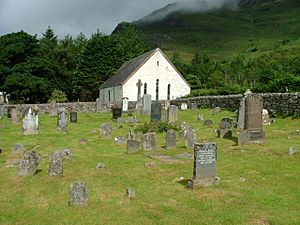Arnisdale Free Church facts for kids
Quick facts for kids Arnisdale Free Church |
|
|---|---|

Arnisdale Free Church of Scotland. Nestling beneath the slopes of Beinn Sgritheall
|
|
| Location | Arnisdale, Scotland |
| Country | United Kingdom |
| Denomination | Free Church of Scotland (Continuing) |
| History | |
| Founded | Parish 1856 |
| Architecture | |
| Functional status | church |
| Heritage designation | Historic Scotland, ID 275646 |
| Completed | 1888 |
Arnisdale Free Church is an old church building located in Arnisdale, a small village in Scotland. It's nestled in a beautiful area near the slopes of Beinn Sgritheall. This church building has a long history, starting as a simple meeting place and later becoming a more permanent structure. It was once used by the Free Church of Scotland and later by the Free Church of Scotland (Continuing).
Contents
History of Arnisdale Free Church
The story of Arnisdale Free Church began in 1856. At first, it was a simple meeting-house. This means it was a basic building where people could gather for church services. It was connected to the Glenelg Free Church of Scotland.
Building the Church
The current church building, which you can still see today, was built in 1888. It was designed by architects named Matthews and Lawrie. The building is described as a "functional hall." It has special window and door shapes called "shouldered arches."
Changes Over Time
For many years, the Free Church of Scotland held services in this building. Around the year 2000, the church building was taken over by a different group. This group was called the Free Church of Scotland (Continuing). This happened after a split within the Free Church of Scotland.
Early Ministers
The first minister for the Glenelg Free Church, which included Arnisdale, was George Corbet. He served from 1843 to 1863. After him, several other ministers led the congregation. These included John Macleod, D. M’Lennan, A. J. Watson, and Alexander M’Diarmid.
The Church Building Today
The Arnisdale Free Church building is whitewashed, meaning it's painted white. It was used for worship until 2017. After that, the building was closed and later sold. It is recognized as an important historical building by Historic Scotland. Its special ID number is 275646.

